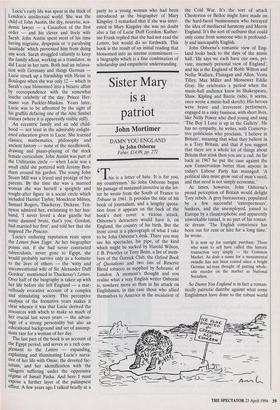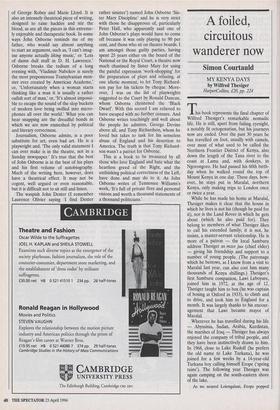Sister Mary is a patriot
John Mortimer
DAMN YOU ENGLAND by John Osborne Faber, £14.99, pp. 272 his is a letter of hate. It is for you, my countrymen.' So John Osborne began his passage of sustained invective in the let- ter he wrote from the South of France to Tribune in 1961. It provides the title of his book of journalism, and a lengthy quota- tion from it appears on the back of the book's dust cover: a vicious attack, Osborne's detractors would have it, on England, the country of his birth. But the front cover is a photograph of what I take to be John Osborne's desk. There you may see his spectacles, his pipe, of the kind which might be sucked by Harold Wilson, J. B. Priestley or Tony Benn, a list of mem- bers of the Garrick Club, the Oxford Book of Quotations and two tins of Reserve Blend tobacco as supplied by Sobranie of London. A moment's thought and you realise what a very English writer Osborne is, nowhere more so than in his attack on Englishmen, in this case those who allied themselves to America in the escalation of the Cold War. It's the sort of attack Chesterton or Belloc might have made on the hard-faced businessmen who betrayed the idea of mediaeval harmony and Merrie England. It's the sort of outburst that could only come from someone who is profound- ly and inescapably English.
John Osborne's romantic view of Eng- land looks back to the days of the music hall. 'He says we each have our own, pri- vate, intensely personal view of England', and his is the England of Robb Wilton and Nellie Wallace, Flanagan and Allen, Vesta Tilley, Max Miller and Monsewer Eddie Gray. He celebrates a period when the music-hall audience knew its Shakespeare, Shaw, Kipling and Barrie (who, it seems, once wrote a music-hall sketch). His heroes were brave and irreverent performers, engaged in a risky business, with short lives, like Nelly Power who died young and sang `The Boy I Love is up in the Gallery'. He has no sympathy, he writes, with Conserva- tive politicians who proclaim, 'I believe in Britain', meaning that what they believe in is a Tory Britain, and that if you suggest that there are a whole lot of things about Britain that stink then you are a cad. As far back as 1967 he put the case against the new Conservatism better than anyone in today's Labour Party has managed: 'A political idea must grow out of man's need, and that need is not simply economic.'
At times, however, John Osborne's proud perception of Britain would delight Tory rebels. A grey bureaucracy, populated by a few successful 'entrepreneurs', bankers, and the unemployed, joined to Europe by a claustrophobic and apparently unworkable tunnel, is no part of his roman- tic dream. The English conscience has been out for rent or hire for a long time,' he wrote.
It is now up for outright purchase. Those who want to sell have called this historic transaction very simply — the Common Market. As drab a name for a monumental swindle has not been coined since a bright German ad-man thought of putting whole- sale murder on the market as National Socialism.
So Damn You England is in fact a roman- tically patriotic diatribe against what some Englishmen have done to the robust world of George Robey and Marie Lloyd. It is also an intensely theatrical piece of writing, designed to raise hackles and stir the blood, as are all the pieces in this extreme- ly enjoyable and therapeutic book. In some ways John Osborne reminds me of my father, who would say almost anything to start an argument, such as, `I can't imag- ine anyone actually liking music,' or 'Lots of damn dull stuff in D. H. Lawrence.' Osborne breaks the tedium of a long evening with, `Vladimir Nabokov is surely the most preposterous Transylvanian mon- ster ever created by American Academe,' or, 'Unfortunately when a woman starts thinking like a man it is usually a rather oafish sort of man,' or, 'It's almost impossi- ble to escape the sound of the slop buckets of modern love being swilled into micro- phones all over the world.' What you can hear snapping are the dreadful bonds in which we are now enmeshed by political and literary correctness.
Journalism, Osborne admits, is a poor substitute for art, even bad art, He is a playwright and, 'The only valid statement I can ever make is in the theatre, not in a Sunday newspaper.' It's true that the best of John Osborne is in the best of his plays and his first volume of autobiography. Much of the writing here, however, does have a theatrical effect. It may not be cogent, well argued or even reasonable, but it is difficult not to sit still and listen.
The waspish John Dexter (I remember Laurence Olivier saying 'I find Dexter rather sinister') named John Osborne 'Sis- ter Mary Discipline' and he is very strict with those he disapproves of, particularly Peter Hall, who apparently said one of John Osborne's plays would have to come off because it was only playing to 90 per cent, and those who sit on theatre boards. I am amongst those guilty parties, having spent 25 years either on the board of the National or the Royal Court, a theatre now much chastised by Sister Mary for using the painful expression 'work-shopping' for the preparation of plays and refusing, at one idiotic moment, to let Tony Richard- son pay for his tickets by cheque. More- over, I was on the list of playwrights suggested to the Court by Ronald Duncan, whom Osborne christened the 'Black Dwarf. With this record I am relieved to have escaped with no further censure. And Osborne writes touchingly and well about the people he admires, George Devine above all, and Tony Richardson, whom he loved but takes to task for his senseless abuse of England and his desertion to America. The truth is that Tony Richard- son wasn't a patriot for Osborne.
This is a book to be treasured by all those who love England and hate what the heartless greed of the Right, and the unthinking political correctness of the Left, have done and may do to it. As John Osborne writes of Tennessee Williams's work, 'It's full of private fires and personal visions and worth a thousand statements of a thousand politicians.'



























































 Previous page
Previous page